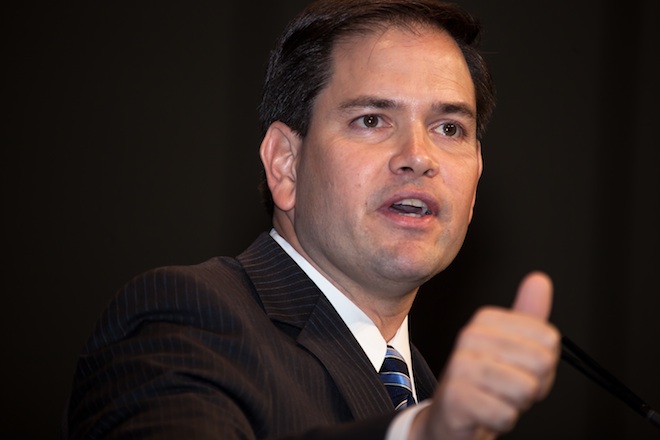Sen. Marco Rubio (R-FL) raised his public profile to new heights Wednesday with a sober foreign policy address that looked to many like a tryout for Mitt Romney’s vice presidential slot. But his new role as the No. 1 potential No. 2 comes with another title as well: Democratic target.
Democrats who talked to TPM insisted that a Rubio pick isn’t necessarily a big deal. Scared or not, Democratic officials took a serious interest in an otherwise sleepy, not particularly partisan, speech before a think tank.
“Rubio Can’t Defend Romney’s Lack of Foreign Policy Leadership,” read an email from the DNC to reporters. Rubio never mentioned Romney in his speech, a fact that Democrats seized on as evidence of a split between the two.
Tweeting during his speech, Obama campaign spokeswoman Lis Smith leapt on Rubio’s praise for President Obama’s Libya intervention. Romney, Smith noted, had criticized efforts to oust Muammar Gaddafi as “mission creep.”
DNC communications director Brad Woodhouse took a more personal shot at Rubio, reviving stories from last year suggesting Rubio exaggerated family members’ refugee status from Cuba.
“So what exactly is Senator Marco Rubio’s [foreign policy] experience in the first place?” Woodhouse tweeted. “That he lied about how and when his parents came to the U.S.?”
Alex Conant, spokesman for Rubio, told TPM the pile-on from Democrats was nothing new.
“The Democrats have been targeting Senator Rubio since he arrived in the Senate, albeit with limited success,” he said in an e-mail. “You’ll have to ask them why they’re so obsessed with a freshman senator.”
Which raises the question: Are Democrats right to be scared enough of Rubio to start tearing him down months before the convention? Rubio backers argue that, if picked as vice president, he’ll help Romney make new inroads with Hispanic voters who have been turned off by years of hard-right Republican rhetoric — including from Romney himself — on immigration. And Rubio has already given Romney a potential opportunity to break with his immigration hawk primary baggage by crafting a watered down, more GOP-friendly version of the DREAM Act that the presumptive nominee has hinted he might support.
Paul Begala, strategist for Democratic super PAC Priorities USA, said he didn’t expect any vice presidential pick to be a game-changer, based on historical precedent, but acknowledged Rubio had the potential to be a strong choice.
“Rubio is high reward/high risk. Just like Palin,” Begala told TPM. “That doesn’t mean he is guaranteed to blow up like Palin, but since that experience is fresh in Republicans’ minds, I’m sure they’re thinking about it.”
Rubio has a Palin-esque potential downside for Republicans too, Begala said: He “has not been thoroughly vetted.” A Rubio pick may also look like a cynical political move given the GOP’s well-known problems with HIspanic voters and the importance of Florida to their general election hopes. On the upside, however, “he’s young and fresh and dynamic,” “better in interviews than Gov. Palin” and — cynical or not — he could actually help in Florida.
Democratic pollster Tom Jensen of PPP, however, saw little in his own data to suggest Rubio posed much of a threat. Most glaring: He’s not particularly popular in his own state, where Romney actually polled worse with him on the ticket, or among Hispanic voters nationally, where he has a 35-42 favorability/unfavorability rating, Jensen said. Rubio’s potential impact was similarly underwhelming even just among Hispanic voters in Florida.
“The current polling evidence suggests that Rubio would be little or no help to Romney in Florida, with Hispanics or overall,” Jensen told TPM. “And he wouldn’t do anything for him nationally with Hispanics either.”






